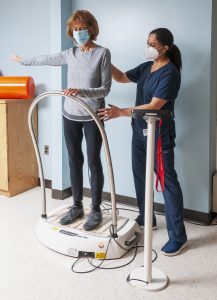Lifestyle for Strong Bones- May is Osteoporosis Month
May 21, 2021 The New York State Osteoporosis Prevention and Education Program headquartered at Helen Hayes Hospital is committed to
The New York State Osteoporosis Prevention and Education Program headquartered at Helen Hayes Hospital is committed to
educating the public about the importance of strong and healthy bones. In honor of National Osteoporosis Month in May, we spoke with HHH’s Payal Sahni, MPT, DPT, Coordinator of NYSOPEP to learn more about healthy lifestyle choices for improving bones health and preventing osteoporosis:
One of the most important factors in promoting bone health and preventing osteoporosis is making healthy lifestyle choices. Healthy lifestyle choices should begin as early as during pregnancy and should continue throughout the lifespan. The earlier that prevention measures are taken, the greater the benefit to bone health. It is important for all individuals, including those with a strong genetic tendency (family history) for osteoporosis, to practice healthy lifestyle choices. Making healthy choices will help you reach your peak bone mass in youth and promote healthy bones later in life.
- Eat a variety of healthy (nutrient-rich) foods. Make half your plate vegetables and fruit, add lean protein, include whole grains, select heart-healthy fats, and remember to include a calcium-rich food or drink at each meal.
- Reach and maintain a healthy weight. Eat the amount of calories and protein you need. The amount that you need will depend on your height, weight, age, and medical condition.
- Get the calcium you need. It is recommended that adults consume 1000 to 1200 milligrams (mg) of calcium each day. It is best to get calcium from the foods you eat. Foods rich in calcium such as low fat dairy foods (milk, yogurt, cheese), dark green leafy vegetables (bok choy, broccoli, collard greens, kale, mustard greens, and turnip greens), canned fish (sardines, salmon) eaten with bones, or calcium-fortified (with calcium added) foods. Try to eat a calcium rich food at each meal. If you think that you are not getting the recommended amount of calcium in the foods you eat, it is important to consult with your healthcare provider to find out if a calcium supplement is right for you.
- Get the recommended amount of vitamin D. There are only a few good natural sources of vitamin D including fatty fish such as catfish, eel, mackerel, salmon, sardines, tuna, and shitake mushrooms. Small amounts of vitamin D are added to all cow’s milk, some types of beverages (almond, coconut, rice, or soy beverages and orange juice), yogurt, cheese, and nutrition bars. Adults 50 years of age and above should consume 800-1000 IU or 20-25mcg daily. Your healthcare provider may recommend more vitamin D than above stated amounts based on your individual needs.
- Be physically active. Your bones get stronger and denser when you make them work. Walking, climbing stairs, and dancing are impact (or weight-bearing) exercises that strengthen your bones by moving your body against gravity when you are standing. Resistance exercises such as lifting weights or using exercise bands strengthens your bones and your muscles too! Tai Chi is an example of physical activity that improves posture and balance to help decrease the risk for falls and fractures. Exercise can be easy; try 10 minutes at a time, adding the minutes up to reach your goal.
- Don’t smoke. If you do, STOP. Call 1-800-NYQUITS for information about how to quit.
- Limit alcohol. Before drinking alcohol, it is important to speak to your healthcare provider about possible interactions with your medication or your medical condition. Too much alcohol can be harmful for your bones and your overall health.
- Take action to prevent falls. Most broken bones occur as a result of a fall that can be prevented. Some actions to prevent falls at home include using nightlights, removing or securing scatter rugs, and getting rid of clutter.
Visit www.nysopep.org to learn more about building healthy bones, as well as ways to prevent, diagnose, and treat osteoporosis. And please join in thanking Dr. Sahni and all of our osteoporosis experts, from therapists to radiologists, for their commitment to educating our community and caring for our patients with osteoporosis!
